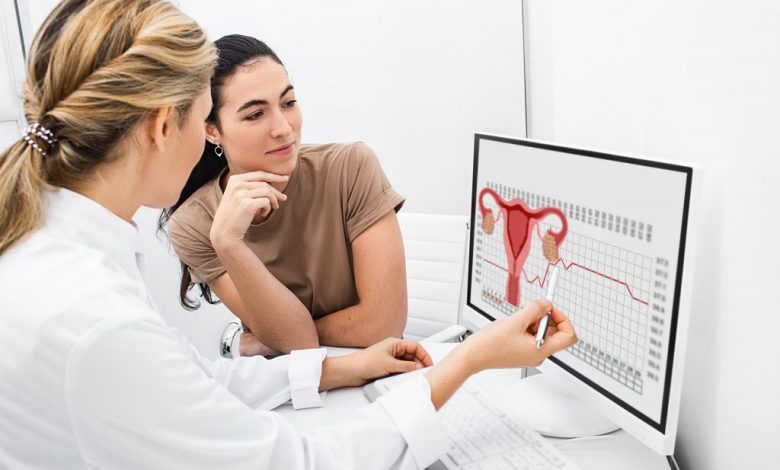All About PCOS and its Ayurvedic Treatment

Polycystic ovarian syndrome(PCOS) is a hormonal disease. Women suffering from PCOS produce more male hormones than usual. Women with PCOS usually have increased androgen levels. Because of this hormonal imbalance, their bodies skip menstrual cycles, making it more challenging for women to get pregnant.
The term “polycystic ovarian syndrome” refers to the development of several small cysts in the ovaries. While some women without the condition develop cysts, some PCOS sufferers do not. PCOS causes an imbalance in your reproductive hormones. In the following article, we will go through PCOS symptoms, causes, diagnosis, and ayurvedic treatment for PCOS.
What Causes PCOS?
PCOS typically runs in families. However, its exact origin is uncertain. It is connected to abnormal hormone levels in the body, especially high insulin levels. Insulin resistance is common in PCOS women. Insulin resistance, or the inability of cells to use insulin effectively, affects up to 70% of PCOS patients.
Increased insulin levels can lead to greater androgen levels in the body. Additionally, obesity might elevate insulin levels and complicate PCOS symptoms.
Symptoms of PCOS
PCOS symptoms and indicators usually occur around the time of a teen’s first period. PCOS can sometimes emerge later in life due to severe weight gain. Not every woman with the disorder will experience every symptom of PCOS.
Irregular or missed menstruation
Back pain,
Severe bleeding
Skin darkening,
Acne,
Excessive body hair, especially on the back, stomach, and chest.
Weight gain, particularly around the abdomen.
Male-pattern baldness
Infertility
PCOS Diagnosis
PCOS cannot be identified by one test. Your physician will begin by inquiring about your symptoms and past medical history before performing a physical examination. Indicators of acne, insulin resistance, and uncontrollable hair growth are the things the doctor will check for during a physical.
The signs of PCOS can resemble those of other illnesses in some cases. As a result, you can also experience tests like:
Blood Test
It is conducted to determine hormone levels. Through testing, it is possible to rule out potential reasons for menstrual abnormalities or androgen overproduction, both of which are symptoms of PCOS. Additionally, you could have your cholesterol and triglyceride levels checked.
Ultrasound
With the help of sound waves, an ultrasound can detect abnormal follicles and other problems with your uterus and ovaries. Both the thickness of the uterine lining and the state of your ovaries are checked by your doctor.
Pelvic Exam
The doctor visually and physically inspects your reproductive organs for lumps, growths, or other anomalies. A pelvic examination can detect problems with your ovaries or other reproductive system components.
Ayurvedic Treatment for PCOS
PCOS must be identified early and managed continuously to avoid long-term issues. Ayurvedic treatments for PCOS often include a combination of medicines, therapies, and lifestyle changes such as dietary changes.
Panchakarma is the initial ayurvedic treatment for PCOS. Panchakarma eliminates toxins from the reproductive system to cure the underlying problem. Therapies such as Vamana, Virechana, Vasti, and Udvartana purify and cleanse the body by emesis or purgation. It encourages conception, supports hormone harmony, and stops weight loss.
Vamana
A technique that involves employing particular ayurvedic medicines to induce oral vomiting. Vamana is essential for the long-term management of PCOS since it improves fertility, supports hormone balancing, and does so.
Virechana
This detoxification technique uses medicinal oils infused with herbal laxatives to help the body eliminate various pollutants. Virechana is an effective ayurvedic treatment for PCOS for managing additional PCOS symptoms and irregular or heavy periods.
Vasti
Vasti is one of the most widely recommended forms of ayurvedic treatment for PCOS. It entails a series of medically supervised enemas carried out over several days.
It dissolves the ovarian cyst more quickly than oral drugs because of its effects on the uterus and ovaries.
Udvartana
This technique entails massaging the full body with dry powder. Body massage helps eliminate the bothersome symptom of PCOS, which is excessive acne. It improves muscle tone and skin cleansing. It is highly recommended to take this therapy to reduce body fat.
Nasya
Nasya is a method of administering dry powders or medicines through the nasal passage. This therapy assists in reducing the symptoms of PCOS by focusing on the hypothalamic-pituitary-ovarian axis.
Herb Therapy
Phytoestrogen-rich herbs used in Ayurveda can significantly reduce insulin resistance and inflammation. Herbal medications such as Triphala, Kanchanar, Trikatu, Guggul, Dashamool, etc., are effective for PCOS.
Conclusion
PCOS is a hormonal disorder, and several tests may be use to diagnose it, including a blood test, ultrasound, and pelvic exam.
Ayurvedic treatment for PCOS is the most effective way to cure this problem. AyurPrakash is a renowned ayurvedic hospital that provides ayurvedic treatment for PCOS. After reading this article, you should know the signs of PCOS. If you have any of these symptoms, you should get proper treatment. You can conquer your condition with the assistance of AyurPrakash Hospital. The medical staff at AyurPrakash is equipped to handle such situations and offer the finest care possible.




